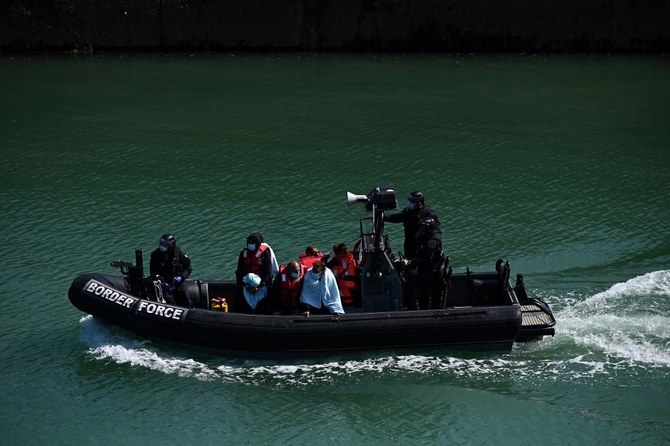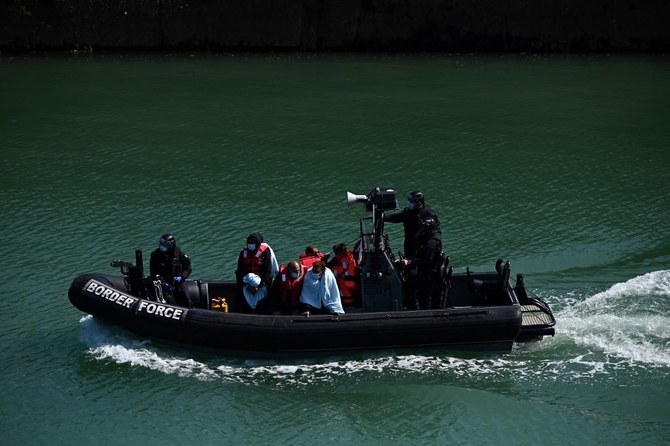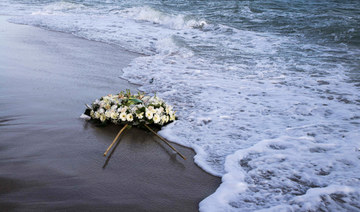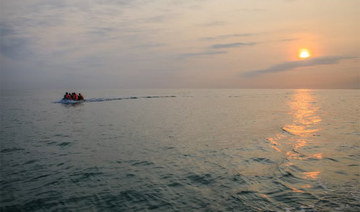LONDON: Britain’s interior minister Suella Braverman defended her policy to remove almost all migrants who arrive without permission, saying her political opponents were “naive do-gooders” and there has been “too much” immigration in recent years.
Prime Minister Rishi Sunak has said that stopping asylum seekers arriving on the south coast of England in small vessels — often unseaworthy inflatable boats and dinghies — is one of his top priorities.
The legislation introduced to parliament on Monday aims to reduce the number of people entering Britain in that way, which last year reached a record 45,000, up 500 percent in the last two years. Many came from countries such as Syria, Afghanistan, Eritrea, Iran and Iraq.
Under the government’s plans, asylum seekers will be detained without bail before they are deported to their home country or, if this is not deemed safe, another safe third country.
Braverman, whose parents migrated to Britain in the 1960s from Kenya and Mauritius, said she had been the subject of “grotesque slurs” and would not be patronized on what appropriate views someone of her background could hold.
“I will not be hectored by out-of-touch lefties,” she told parliament. “It’s perfectly respectable for a child of immigrants like me to say that I’m deeply grateful to live here, to say that immigration has been overwhelmingly good for the United Kingdom, but we’ve had too much of it in recent years.”
The Illegal Migration Bill is expected to be heavily contested in parliament and in the courts, setting up a clash over how to deal with the arrivals of small boats ahead of the next election expected next year.
As members of parliament debated the new law in the House of Parliament on Monday, hundreds of people gathered outside to protest against the legislation.
Only in limited circumstances, such as people who were considered too ill to fly or those at a “real risk of serious and irreversible harm,” would people be allowed to claim asylum under the proposals.
Some lawmakers said in the debate they were concerned that the legislation that could allow the deportation of families, pregnant women, and torture victims.
Asked if she was satisfied if there was enough provision to protect vulnerable children, Braverman said she was comfortable with the levels of safeguarding.
“Let’s be honest, the vast majority of arrivals — 74 percent in 2021 — were adult males under the age of 40,” she said.
“The vast majority were not pregnant women, the vast majority were not young women. All traveled through safe countries like France, in which they could and should have first claimed asylum.”
UK interior minister attacks ‘naive do-gooders’ amid criticism of small boats strategy
https://arab.news/48qdu
UK interior minister attacks ‘naive do-gooders’ amid criticism of small boats strategy

- PM Rishi Sunak has said that stopping asylum seekers arriving on the south coast of England in small vessels is one of his top priorities
New IsDB financing plan to strengthen Bangladesh’s energy, food security

- International Islamic Trade Finance Corp. offers $2.75bn support
- For the first time financing extended for Bangladesh’s fertilizer imports
Dhaka: A new agreement on a $2.75 billion Islamic Development Bank financing loan for the Bangladeshi oil and agriculture sectors aims to boost the South Asian nation’s energy and food security by facilitating the import of petroleum products, liquified natural gas and fertilizers.
The International Islamic Trade Finance Corp., a division of the Jeddah-based IsDB, announced earlier this week that it had signed a “landmark annual financing plan with the Government of Bangladesh for US$2.75 billion to support the country’s energy and agriculture sectors.”
The plan will cover the period from July 2025 to June 2026 and will “facilitate the importation of petroleum products, Liquified Natural Gas (LNG) and fertilizers by Bangladesh Petroleum Corporation (BPC), Bangladesh Oil, Gas & Mineral Resources Corporation (Petrobangla) and Bangladesh Agricultural Development Corporation (BADC) respectively,” the ITFC said in a statement.
Bangladesh imports most of its fuel and requires about 1.5 million metric tons of crude oil annually, according to BPC.
The IITFC loan will help the state-owned entity responsible for importing and marketing fuel oil meet its obligations to the suppliers. The two main ones are Saudi Aramco and the UAE’s Adnoc.
“Without the loan support from ITFC, it wouldn’t have been possible for us to ensure a smooth petroleum supply in the local market. For importing crude oil, we need a letter of credit support of around $80 million. Our state-owned banks can’t provide such a huge amount,” Mohammed Morshed Hossain Azad, BPC’s general manager of finance, told Arab News.
“ITFC pays this amount to Saudi Aramco and UAE-based Adnoc on behalf of Bangladesh Petroleum Corp. After six months, we repay this amount to ITFC in installments through our state-owned banks. This loan support from ITFC was crucial for Bangladesh’s energy security … For maintaining a smooth and uninterrupted supply of fuel in our market, there is no alternative in hand.”
While Bangladesh’s energy imports have been supported by ITFC financing before, it is the first time that fertilizer imports are too.
Bangladesh’s annual demand for chemical fertilizers is about 6 million metric tons, of which about 80 percent comes from abroad.
“The timely supply of fertilizer is very important for ensuring the food security of around 175 million people of Bangladesh,” Mohammed Moazzem Hossain, BADC accounts controller, told Arab News.
Under the ITFC deal, the BADC will import triple superphosphate and diammonium phosphate from Saudi Arabia, Tunisia and Morocco.
“We import DAP and TSP fertilizer from these three Muslim countries,” Hossain said.
“This is the first time in the history of Bangladesh that we have received loan support for importing fertilizer. The interest rate is also convenient for us.”
Thousands to be evacuated after Mount Ibu eruption

TERNATE: Thousands of islanders are set to be evacuated after a volcano erupted in eastern Indonesia, spewing a towering column of smoke and ash into the atmosphere, officials said Wednesday.
Mount Ibu, located on the remote island of Halmahera, erupted for a fifth time this year on Wednesday, sending a column of smoke four kilometres (2.5 miles) into the sky.
The volcano's alert status was subsequently raised to the highest level by Indonesia's Geological Agency.
"Following the increase in Mount Ibu's (alert) level, today we will evacuate residents in five villages," said local disaster management head Wawan Gunawan Ali.
He added that local authorities were planning to evacuate approximately 3,000 residents from nearby villages on Wednesday evening.
Many residents had already gathered in a village hall, ready for evacuation, an AFP reporter on the ground reported.
Mount Ibu has shown a significant increase in volcanic activity since last June, following a series of earthquakes.
In the first weeks of January alone, the volcano, which is one of Indonesia's most active, erupted four times.
Residents living near Mount Ibu and tourists have been advised to avoid a five to six kilometre exclusion zone around the volcano's peak and to wear face masks in case of falling ash.
As of 2022, around 700,000 people were living on Halmahera island, according to official data.
Indonesia, a vast archipelago, experiences frequent seismic and volcanic activity as it lies along the Pacific Ring of Fire.
Last November, Mount Lewotobi Laki-Laki, a 1,703-metre (5,587-foot) twin-peaked volcano on the tourist island of Flores erupted more than a dozen times in one week, killing nine people in its initial explosion.
Mount Ruang in North Sulawesi province erupted more than half a dozen times last year, forcing thousands from nearby islands to evacuate.
German minister says ‘historic opportunity’ to support new Syria

- Schulze announced that Berlin was expanding an international hospital partnerships program to include facilities in Syria
Damascus: Germany’s Development Minister Svenja Schulze promised to support Syria’s “peaceful and stable development” as she visited Damascus on Wednesday to meet with the interim authorities.
“After over 50 years of dictatorship and 14 years of civil war, Syria now has the chance of peaceful and stable development,” Schulze said in a statement.
Her visit comes a little over a month after Islamist-led forces toppled longtime president Bashar Assad.
Schulze is due to meet with the new leadership as well as aid organizations “to identify how Germany can support the development of a peaceful, stable and inclusive Syria,” the minister’s statement said.
“It would be wrong of us not to use this historic window of opportunity to support Syria in embarking on a peaceful new beginning,” she said.
“Germany can do a lot to support the new beginning for... Syrian society.”
Germany is home to Europe’s largest Syrian diaspora community, having taken in nearly a million people from the war-ravaged country.
A German study last month said that if they returned home, Germany could face labor shortages, particularly in the health care industry.
Schulze announced that Berlin was expanding an international hospital partnerships program to include facilities in Syria.
The expansion is part of reconstruction efforts but also aims at retaining “vital” medical professionals in Germany, according to the statement.
Schulze said that while “Syria’s new rulers are keen to regain the skilled workers and professionals who fled the country” during the civil war since 2011, “Germany also has an interest in retaining them.”
Under the expanded program, “doctors from Germany can visit Syria to conduct medical training courses or to train their Syrian colleagues in using new equipment,” the minister said.
“And Syrian doctors can come to Germany for training on both medical and organizational issues.”
Syria has seen a flurry of diplomatic activity since Assad’s fall on December 8, with German Foreign Minister Annalena Baerbock also traveling to Damascus earlier this month.
Mozambique inaugurates new president amid deadly unrest

MAPUTO: Mozambique kicked off an inauguration ceremony Wednesday where President-elect Daniel Chapo will be sworn into office after weeks of deadly political unrest, but the main opposition leader has vowed to “paralyze” the country with fresh protests against the fiercely disputed election result.
Venancio Mondlane had already called for a national strike in the days leading up to the inauguration and threatened on Tuesday to curtail the new government with daily demonstrations.
Mondlane, 50, who is popular with the youth, maintains the October 9 polls were rigged in favor of Chapo’s Frelimo party, which has governed the gas-rich African country since independence from Portugal in 1975.
“This regime does not want peace,” Mondlane said in an address on Facebook Tuesday, adding that his communications team was met with bullets on the streets this week.
“We’ll protest every single day. If it means paralysing the country for the entire term, we will paralyze it for the entire term.”
Chapo, 48, called for stability on Monday, telling journalists at the national assembly “we can continue to work and together, united... to develop our country.”
International observers have said the election was marred by irregularities, while the EU mission condemned what it called the “unjustified alteration of election results.”
The swearing in ceremony was expected to be snubbed by foreign heads of state, a move “which sends a strong message,” Maputo-based political and security risk analyst Johann Smith told AFP.
Former colonial ruler Portugal is sending Foreign Minister Paulo Rangel.
“Even from a regional point of view there is a hesitancy to acknowledge or recognize that Chapo won the election,” Smith said.
However, neighboring South Africa’s President Cyril Ramaphosa was at the ceremony.
Amid tensions, security forces blocked roads throughout the capital Maputo and around Independence Square, where the swearing-in is being held.
The extent of the unrest from now on “depends on how Chapo will tackle the crisis,” analyst Borges Nhamirre told AFP.
The inauguration of parliamentary lawmakers Monday was held amid relative calm.
The streets were deserted, with most shops closed either in protest against the ceremony or out of fear of violence, while military police surrounded the parliament building and police blocked main roads.
Still, at least six people were killed in the Inhambane and Zambezia regions north of the capital, according to local civil society group Plataforma Decide.
Unrest since the election has claimed 300 lives, according to the group’s tally, with security forces accused of using excessive force against demonstrators. Police officers have also died, according to the authorities.
Chapo, who is expected to announce his new government this week, could make concessions by appointing opposition members to ministerial posts to quell the unrest, said Eric Morier-Genoud, an African history professor at Queen’s University Belfast.
There have also been calls for dialogue but Mondlane has been excluded from talks that Chapo and outgoing President Filipe Nyusi have opened with the leaders of the main political parties.
Chapo has repeatedly said however that he would include Mondlane in talks.
Mondlane, who returned to Mozambique last week after going into hiding abroad following the October 19 assassination of his lawyer, has said he was ready for talks.
“I’m here in the flesh to say that if you want to negotiate... I’m here,” he said.
According to official results, Chapo won 65 percent of the presidential vote, compared to 24 percent for Mondlane.
But the opposition leader claims that he won 53 percent and that Mozambique’s election institutions manipulated the results.
Frelimo parliamentarians also dominate the 250-seat national assembly with 171 seats compared to the Podemos party’s 43.
Russia fires over 40 missiles at Ukraine’s energy sector: Zelensky

KYIV: Russia launched more than 40 missiles and over 70 attack drones in an overnight barrage that targeted Ukraine’s energy sector, Ukrainian leader Volodymyr Zelensky said Wednesday.
“More than 40 missiles were involved in this strike, including ballistic missiles. At least 30 were destroyed. There were also more than 70 Russian attack drones overnight,” Zelensky said in a statement on social media.
















